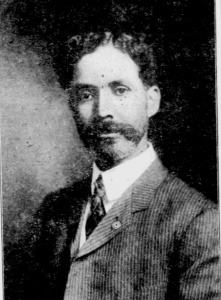
(Aug. 26, 1872 – Dec. 12, 1956). Joseph Henry Ward was born in Wilson, North Carolina. He left Wilson as a teenager and took odd jobs in the Washington, D.C., area, where he met Dr. George Hasty of Indianapolis in 1889. Hasty saw potential in Ward and convinced him to accompany him to Indianapolis. He enrolled Ward in the eighth grade in the . A gifted speaker, Ward gave the class address when he graduated from in 1894. Ward then attended the Physio-Medical College of Indiana, graduating on March 18, 1897. He took advanced medical training at the Indiana Medical College and advanced surgical training at the Polhemus Memorial Clinic in Brooklyn, New York.
Ward began his medical practice immediately after his graduation, establishing an office at 435 . He later decided he wanted to be a surgeon. Because hospitals in Indiana would not allow him to practice medicine or perform surgery, Ward opened his own hospital sometime around 1906. Ward Sanitarium, a surgical hospital for African Americans, was located in the 700 block of Indiana Avenue.
Ward added a training school curriculum for nurses in 1909. He was a member of the and an organizer and charter member of the Indiana Association of Negro Physicians, Dentists, and Pharmacists in 1908.
In 1917, Ward volunteered to serve in the U.S. Army Medical Corps during World War I. He trained at Camp Dodge in Des Moines, Iowa, completing the “Medical Officer Training Camp – Colored” and was commissioned as a First Lieutenant. Assigned to the 325th Signal Battalion of the 92nd Infantry Division, he embarked for France, aboard the USS Orizaba. His unit set up operations in the area around Nancy, France. By the war end of the war, Ward held the rank of major and became the first African American to lead a U.S. Army Field Hospital.
Upon his return to the U.S. in early 1919, Ward remained at Camp Upton in New York to care for men returning from the war. While at Camp Upton, he received word that his most famous patient, , had fallen ill. Ward received leave from his military duties to go to Irvington, New York, to care for her at her home. He was at her bedside when she died on May 25, 1919.
Ward finally arrived home in June 1919 and set about rebuilding his medical practice, as he and his wife adjusted to the death of their son Joseph Jr., a victim of the 1918 Spanish flu pandemic.
In 1923, Dr. Ward accepted an appointment as administrator and chief medical officer of Veterans Hospital #91 at Tuskegee, Alabama. When he took this role, he became the first African American to lead a major U.S. hospital. Rather than integrate the existing hospitals, the United States government constructed this hospital as a separate facility to care for the 600,000 Black World War I veterans.
Ward oversaw this 600-bed hospital for 12 years. He sought and hired the most qualified African Americans available to staff it and set the standard for efficiency and effectiveness among all Veterans Administration hospitals.
He returned to Indianapolis in July 1936 and again reestablished his medical practice. Around 1942, he closed the Ward Sanitarium stating that it was no longer needed as the began to desegregate and employ African American doctors on the hospital staff. He practiced medicine for several more years.
Ward was also a prominent civic leader and participated actively in the quest to establish and promote Black businesses in Indianapolis, including helping Madam C. J. Walker set up her beauty product business. Ward was one of the founders of the and served as chairman of its committee of management. He also was vice president of the board of trustees for the YMCA Metropolitan Board.
A 33rd degree Mason and Grand Chancellor of the Knights of Pythias, Ward was also a member of the and a congregant of .
In December 1954, Zella Ward (nee Locklear), his wife of 50 years, died unexpectedly, devastating Ward. He died two years later at the Indianapolis Veterans Administration Hospital after suffering a massive stroke. He is buried at .
Despite the obstacles of the Jim Crow era, Ward’s accomplishments were outstanding. In August 2019, the state of Indiana erected a historical marker to commemorate his achievements as a physician, surgeon, entrepreneur, army officer, and his distinction as the first African American to lead a U.S. Army Field Hospital and the first African American to lead a major hospital in the United States.

Help improve this entry
Contribute information, offer corrections, suggest images.
You can also recommend new entries related to this topic.